|
Many films of the period have become icons of resistance. Many also helped maintain morale. Some did even more ....
|
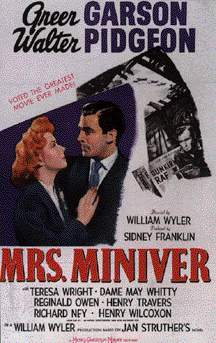 |
Mrs Miniver (1942)
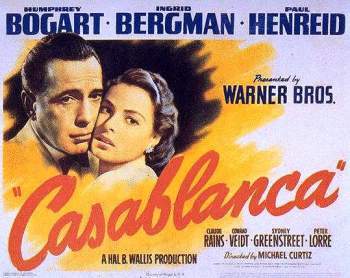
This story of an average English middle-class family begins with the summer of 1939; when the sun shone down on a happy, careless people, who worked and played, reared their children and tended their gardens in that happy, easy-going England that was so soon to be fighting desperately for her way of life and for life itself.
Prologue to MRS. MINIVER
But more than its appeal to the Academy of Motion Picture Arts and Sciences or even its popular appeal at the time, it was the top-grossing film of 1942 and the second biggest box-office hit of the decade, were MRS. MINIVER's effects on the isolationist temperaments of its 1940s American audience. There was not a single battle scene in this war film, yet through its portrayal of the hardships suffered and overcome by a middle-class English family during the Blitz, Americans came to sympathize with the English, and support for American involvement in the European war rose dramatically. Director William Wyler even acknowledged this as a primary motive for the film when he commented, "I was a warmonger. I was concerned about Americans being isolationists. MRS. MINIVER was obviously a propaganda film."
|
Casablanca (1942) - the big one as far as war movies is concerned
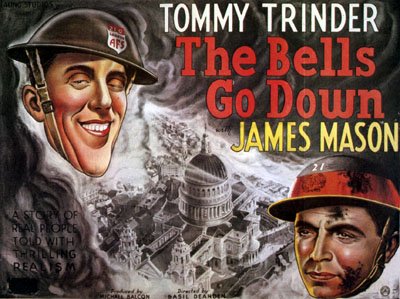
The ultimate classic movie. It may not be the most moving or meaningful, but it has something for everyone, and it's one of those films you can watch over and over again, and every time find something you hadn't noticed before. In fact, I'm one of those people who not only thinks that everyone should see it, but who is also of the opinion that the more times you see it, the better it gets.
The love story between Ingrid Bergman and Humphrey Bogart has already gone down in history, and will probably end up being as eternal as Romeo and Juliet. At the same time, CASABLANCA is filled with colorful supporting characters who make it humorous, melodramatic, and even adventuresome all at the same time. If you only intend to see one classic movie in your lifetime, this is probably the one - and please, if you're going to make the effort, don't waste your time with the colorized version; it simply isn't the same. |
|
British films of the 40s are valuable social documents.
Here are some I have found particularly evocative of the time
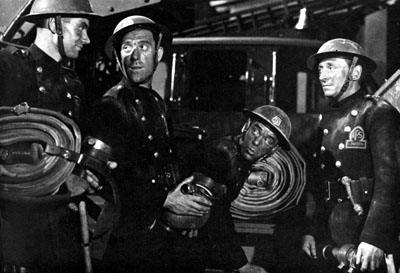
"The Bells Go Down" was released in April 1943 and directed by Basil Dearden, the film is set in East End of London, where we follow the experiences of an assorted group of Auxiliary Fire Service (AFS) volunteers facing the Blitz of 1940. The film explores the way in which ordinary people, plunged into war, find within themselves the capacity for bravery and dedication. The crook in the group (Mervyn Johns) rescues the policeman who in peacetime has arrested him. Tommy Trinder, whose personality to some extent unbalances the cohesion of the group, is allowed to die heroically, trying to save the life of his hated commander (Finlay Currie).
It was unfortunate for the Ealing film that it was released in the same week as Humphrey Jennings's Crown documentary, Fires Were Started, which again told a story of the AFS in London three years earlier. Jennings was already moving from 'pure' documentary towards fiction film techniques and, although his actors were all seconded firemen, they were given lines to speak, albeit improvised on the set rather than formally scripted in advance. By comparison with Jenning's film however, Dearden's looks like a polished studio work, an entertainment with a serious theme. Yet it amounted to hyper-realism when compared with the standard Hollywood view of Britain at war, exemplified by William Wyler's Mrs Miniver.
In the year before Trinder also starred in what is a minor classic British movie "The Foreman Went To France".
Based on the real experiences of one Melbourne Johns, who managed to retrieve some vital machinery from under the noses of the advancing Germans. Clifford Evans played the foreman, renamed Ted Carrick for the film, who surmounts the obstacles of red tape to reach France, and then faces dive-bombers, refugee-clogged roads, spies disguised as British soldiers and the ever-advancing enemy. He falls in with a pair of tommies separated from their unit, one played by the comedian Tommy Trinder, the other by the Scottish actor Gordon Jackson, who was suggested for the part by the playwright James Bridie. Their adventures are shared by an American girl (Constance Cummings). The French sea captain who eventually brings the group back to Britain was identified in the credits as Francois Sully, although he is easily recognised as the corpulent British character actor, Francis L. Sullivan, an example of Ealing's occasional whimsicality.
The film portrayed a small group of people from different walks of life beset by great odds, but winning through together, and it was the most satisfying Ealing war film to date, establishing what was to be a formula for many serious films and several of the post-war comedies. Frend's approach, following a narrative storyline that was written by J. B. Priestley, and scripted by John Dighton, Angus MacPhail and Leslie Arliss, was steady and careful. The only palpable directorial flaw was the casting of Trinder, who was allowed to play in a much broader vein than the others, and undoubtedly many people were lured into the cinema expecting an entertainment in the 'You Lucky People!' vein.
|
For one of the best works of reference on Ealing films I recommend "Forever Ealing" by George Perry - available from Amazon.

|
|
In a still from "The Bells Go Down": Philip Friend, Tommy Trinder, Mervyn Johns and William Hartnell.
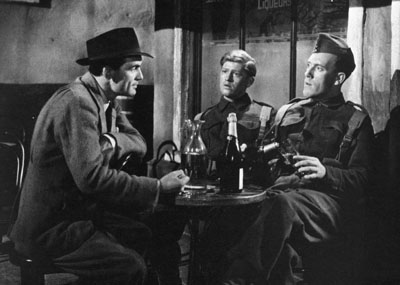
|
Ice Cold In Alex - a cult classic and a must for any devotee of British war movies

Gripping wartime drama based on a true story; the film follows an ambulance commander and his efforts to transfer two nurses safely across the desert in enemy occupied North Africa - unaware that a German secret agent is watching their every move.
It's 1942 and war is raging in the North African desert. Alcoholic Captain Anson (John Mills) and Sergeant Andrews (Harry Andrews) are escorting nurses Diana Murdoch (Sylvia Sims) and Denise Norton (Diane Clare) from Tobruk to Alexandria. After leaving Tobruk they come across shifty South African Captain van der Poel (Anthony Quayle) who wishes to ride with them, his initial request to join them is refused by Anson until he offers three bottles of gin as payment. The group must first contend with an enemy minefield, a task made easier for them by the German Luftwaffe who clear a route through the minefield for their own armoured division. The ambulance meets a German patrol while crossing the desert and attempt to escape by out running the German half-tracks, during the ensuing chase Sister Norton is shot and killed. The group disguises her as their patient and the German patrol guides them safely through the minefield before allowing the ambulance to continue on its voyage.
Anson becomes suspicious of van der Poel due to a mysterious pack he clings to, Anson begins to covertly question him about his military past but the answers seem plausible. Anson’s suspicions are only heightened when they meet another German patrol and van der Poel seems to persuade the German officer to allow them to continue despite the fact they no longer have a patient. The group continues on their journey but they must contend with heat, sand and the ambulances' temperamental engine. They begin become more doubting of van der Poel and his secret pack, Sergeant Pugh decides to follow van der Poel van der Poel on one of his frequent walks into the desert and discovers the pack is in fact a transmitter.
Captain van der Poel goes on another one of his frequent walks during the night and falls into quicksand, Anson quickly turns on the ambulances headlights in an attempt to see what the South African is doing. Scared of being exposed, van der Poel pushes the transmitter into the quicksand and then calls for help. After rescuing him and having seen the transmitter the rest of the group believe van der Poel to be a spy, but decide to not take any action in the belief he will be of use to them during the journey. He certainly does come in useful when they meet their greatest obstacle, a sand hill that is so steep they can only overcome it by using the engine starter handle to manually drive the ambulance over the arduous hill.
Together they finally succeed and eventually reach Alexandria, then fulfil Captain Anson’s promise of an ice-cold beer in Alex. Captain Anson has a surprise in store though, he has arranged for the Military Police to arrest van der Poel at the bar. Captain van der Poel owns up to being part of a German Panzer division and before leaving with the Military Police admits to having learnt a lot about the English and what had become their common foe during the trek - the desert.
Unmissable - and a must for any collector of war movies.
|
|
Still from: "The Foreman Went To France", Clifford Evans, Gordon Jackson and Tommy Trinder.
|
|